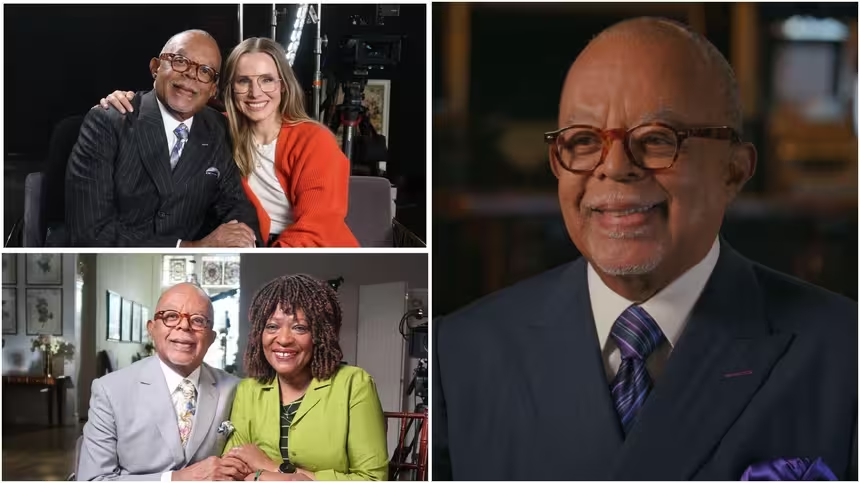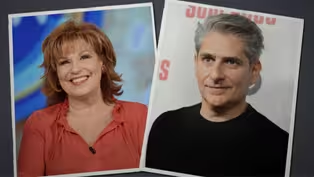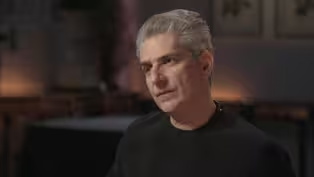Finding Your Roots
Joy Behar Discovers Her Grandfather's Immigrant Story
Clip: Season 11 Episode 2 | 4m 3sVideo has Closed Captions
Joy Behar's grandparents move to America and forge a new life.
Joy Behar's grandfather sought a new life in America, but after only four years moved back to Calabria, Italy in 1907. He then married her grandmother, Francesca. He ultimately moved back to Pennsylvania and left her behind, where he was able to make enough money to send back for her. Francesca met him there in 1911 where they had their first child, Joy's mother, but Francesca passed away shortly.
Problems playing video? | Closed Captioning Feedback
Problems playing video? | Closed Captioning Feedback
Corporate support for Season 11 of FINDING YOUR ROOTS WITH HENRY LOUIS GATES, JR. is provided by Gilead Sciences, Inc., Ancestry® and Johnson & Johnson. Major support is provided by...
Finding Your Roots
Joy Behar Discovers Her Grandfather's Immigrant Story
Clip: Season 11 Episode 2 | 4m 3sVideo has Closed Captions
Joy Behar's grandfather sought a new life in America, but after only four years moved back to Calabria, Italy in 1907. He then married her grandmother, Francesca. He ultimately moved back to Pennsylvania and left her behind, where he was able to make enough money to send back for her. Francesca met him there in 1911 where they had their first child, Joy's mother, but Francesca passed away shortly.
Problems playing video? | Closed Captioning Feedback
How to Watch Finding Your Roots
Finding Your Roots is available to stream on pbs.org and the free PBS App, available on iPhone, Apple TV, Android TV, Android smartphones, Amazon Fire TV, Amazon Fire Tablet, Roku, Samsung Smart TV, and Vizio.
Buy Now

Explore More Finding Your Roots
A new season of Finding Your Roots is premiering January 7th! Stream now past episodes and tune in to PBS on Tuesdays at 8/7 for all-new episodes as renowned scholar Dr. Henry Louis Gates, Jr. guides influential guests into their roots, uncovering deep secrets, hidden identities and lost ancestors.Providing Support for PBS.org
Learn Moreabout PBS online sponsorshipVincenzo eventually settled in a Pennsylvania mill town.
But he wasn't done taking risks.
In 1907, after just four years in America, he returned to Calabria, where he married Joy's grandmother, a woman named Francesca, or Frances Zagari.
Then within months, Vincenzo got onto a boat once again, and headed back to Pennsylvania, leaving his new bride behind.
He left her in Santa Eufemia?
Yeah.
And came back to Pennsylvania?
And he came back solo.
So why do you think he left her behind?
Any theories?
Oh.
Well, he must have come here to get work, and he didn't feel like he could support her maybe at first.
Like a lot of immigrants, they come here from parts of South America, let's say.
They make a living, or parts of Asia, they work hard and then they send for their children, and their children go to college.
I mean, that's how it works.
Sure, or he didn't have enough to pay for the fare.
That's possible too.
You stay here, and then we'll work it out.
And I'll come back and get you.
I mean, we don't know, but we suspect that your grandparents didn't have enough money to come over together.
When you describe their life, it's so hard.
Yeah.
Such a hard life.
I mean hard scrabble, bottom line.
Really, the toughest, toughest.
After returning to America, it seems that Vincenzo was in fact able to earn enough money to send for his wife.
By 1911, Frances was living in Pennsylvania, and Joy's mother would be born later that same year.
Yet tragically, the family's happiness would not last.
"Frances Carbone, occupation housewife.
Date of death, October 24th, 1912."
Yeah.
How sad is that?
One year.
"Death was in Osceola Mills, Pennsylvania.
Acute nephritis."
Oh, kidney disease.
Kidney disease.
So my mother was born in 1912, and that was the year she died.
Your mother wasn't even one year old when her mother died.
Oh my God, awful.
And I don't know if you know, but nephritis can be a complication of childbirth.
From childbirth?
I did not know that.
So my poor mother was alone with her father.
Did your mother ever talk to you about how losing her mother affected her?
I mean, she was too young to remember it, obviously.
No, she never discussed it really.
In fact, I didn't know about Frances until I was 17 years old.
My mother sat me down when I was 17, and she said, "Listen, I have to tell you something."
And I thought, what is she gonna tell me?
And then she told me, "Your grandma Antonia, who you were raised with, is not your biological grandmother.
Your real biological grandmother died when I was born."
Joy told me she believes that her mother never fully processed the loss of her own mother.
And it's easy to understand why.
Within months of Frances's death, Vincenzo took his infant daughter back to Calabria where she would spend the next 13 years, growing up in the world that her father had tried so hard to escape.
Did she talk to you much about that time?
No.
She used to tell me things like, oh yeah, she told me... She'd make up stories that were so pathetic.
She'd say, "My father wanted me to learn the piano, and we would bring fruit to the piano teacher to bargain with."
And then she would learn a little bit on the piano.
They didn't have money, so they brought food.
Stuff like that.
But that's smart.
Yeah.
But sad.
Yeah.
But it made you think like, oh my God, they had nothing.
But could she play the piano?
No, not enough fruit.
We don't know why Vincenzo chose to remain back in Calabria for so long.
But it would appear that he never lost his desire to immigrate.
And in 1925, after remarrying, he set off for America one final time, bringing Joy's mother along with him.
"Vincenzo Carbone, 45, occupation laborer," whatever that is.
"Name and address of relative in country whence alien came, wife Antonia," that's the step grandmother.
"Whether going to join a relative or friend?
Residence, 506 Metropolitan Avenue, Brooklyn.
Purpose of coming to the United States, permanent.
Intends to become a citizen, yes."
Yes, there's your mother at 14 years of age, returning to the United States with her father.
What do you think that moment must've been like for your mom?
I think it must have been traumatic.
First of all, I'm sure she didn't speak any English at that point.
When I was growing up, she spoke perfect English, but as a child, I don't think she did 'cause she was in Italy.
So she comes to this country, she has no education.
They still have no money.
The only thing she knows how to do is sew.
She was an incredible seamstress by the way.
She would make slip covers and bridal gowns.
She was incredible.
But at that age, they put her to work in a factory right away.
See, I could start crying now from this.
That makes me sad that my poor mother at 14 is thrown into a factory already.
She had no chance, no chance and couldn't go to school.
There was no way to go to school.
No way to do a life that was really successful I guess.
Joy's mother would spend much of her life working as a seamstress in Brooklyn.
But she and her father had nevertheless accomplished something marvelous.
They had transplanted themselves at enormous cost to a new country.
And on June 22nd, 1926, Vincenzo crowned that transformation by becoming an American citizen.
So what's it like to see all this effort documented?
It's very touching, frankly.
And um...
I know that I didn't come from...
I was not to the manor born, I realize what my background has been and I feel that I'm standing on the shoulders of people here.
That they worked and struggled, and here I am.
But they believed that things would get better, that there was a future.
Yes.
Well, that's what America does.
That's the beauty of this country, that it does say to people in these dire circumstances, they say, the Statue of Liberty, "Give me your tired, your poor," and they believe it around this world and they come here.
It's kind of a nice story in a way that America opened its arms to all of these people.
And it's because they did all this that I can be here, that I can have a successful life.
It's because of what they did, and I appreciate it.
Video has Closed Captions
Preview: S11 Ep2 | 30s | Henry Louis Gates, Jr. explores the Italian roots of Joy Behar & Michael Imperioli. (30s)
The Train Accident in Michael Imperioli's Family History
Video has Closed Captions
Clip: S11 Ep2 | 4m 2s | Michael Imperioli learns about his maternal great grandfather's death as a train worker in New York. (4m 2s)
Providing Support for PBS.org
Learn Moreabout PBS online sponsorship

- History
Great Migrations: A People on The Move
Great Migrations explores how a series of Black migrations have shaped America.












Support for PBS provided by:









